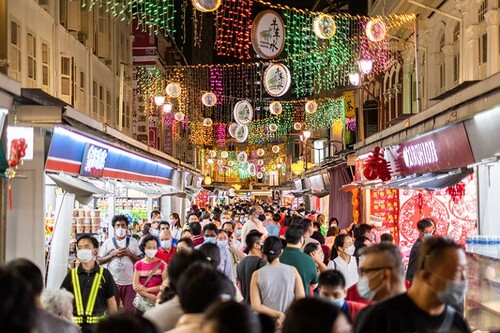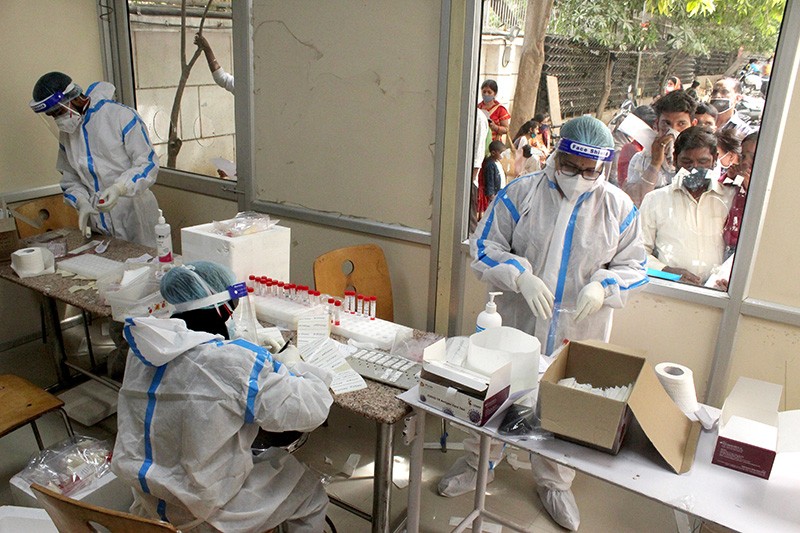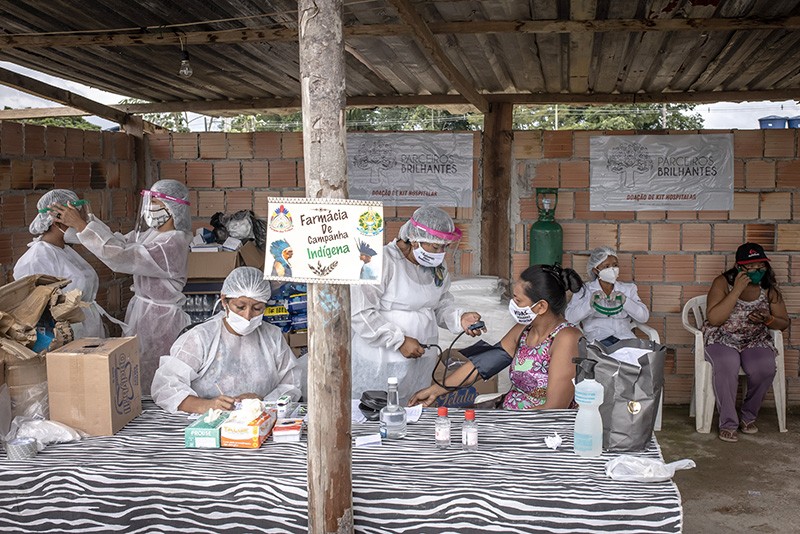

Global COVID-19 cases have fallen significantly since they peaked in early January. Scientists are asking whether this is the beginning of the end of the pandemic.

Staff at a hospital in New Delhi, India, collect swabs to test for infections of SARS-CoV-2.Credit: Mayank Makhija/NurPhoto via Getty
In India, for example, an as-yet-unpublished nationwide survey of more than 28,000 people in late December and early January estimated that 22% of those aged 10 and older had already been infected. That figure exceeds 40% in megacities such as New Delhi and Mumbai, says Manoj Murhekar, an epidemiologist and director of the National Institute of Epidemiology in Chennai who is one of the researchers behind the work.
He thinks this means that India probably won’t return to the peak of about 100,000 new daily cases, seen in September. But more than three quarters of the population is still susceptible to infection, meaning Indians “can’t become complacent”, adds Murhekar.
Elsewhere in the world, populations have not reached the levels of natural immunity seen in India’s megacities, and the fall in cases since late January has instead been driven by lockdowns and social distancing.
For example, a meta-analysis1 of antibody studies, published in The Lancet on 8 March, found that India had one of the highest percentages of antibody prevalence in the general population of any country included in the analysis — with about 20% of people testing positive for antibodies against SARS-CoV-2 — but estimates reached as low as 7% in the Americas, 5% in Europe and 2% in western-Pacific nations. People who develop some immunity to SARS-CoV-2 are thought to be protected from severe disease, but researchers do not know how long that protection lasts.
If people in relatively low-prevalence regions start mixing again when restrictions are relaxed, cases could once more begin to rise, researchers warn.
And what happens in the United States — which accounts for almost a quarter of all recorded worldwide COVID-19 cases to date — will have an important effect on the global trajectory. Although the portion of the US population that’s tested positive for antibodies is lower than that in India, in some states, more than a quarter of the people tested had antibodies against the virus in late January, according to the US Centers for Disease Control and Prevention.
But the overall numbers don’t reflect large variations within communities, says Marm Kilpatrick, an infectious-disease researcher at the University of California, Santa Cruz. Immune protection could explain the fall in some communities where people have been very highly exposed to the virus, but the drop in other communities is probably due to people hunkering down since the holiday period in November and December, says Kilpatrick. As some states lift restrictions, people could start to socialize again, he says.
“It worries me that the US is taking a strong step back from controls,” adds Baker.
A similar situation is unfolding in the United Kingdom and parts of Europe, where plans to reopen risk new waves of infection, says Sebastian Funk, an epidemiologist at the London School of Hygiene & Tropical Medicine. Focusing too much on global numbers overlooks significant variations nationally, he says.

In the Amazonas state city of Manaus, Brazilian healthcare workers treat patients in January 2021.Credit: Jonne Roriz/Bloomberg via Getty
The situation is murkier in many developing nations, where information about numbers of infections is scarce. If sub-Saharan Africa had seen similar surges to those observed in India and the United States, “then we would certainly be over the global peak”, says Joseph Lewnard, an infectious-disease epidemiologist at the University of California, Berkeley. But these surges have not materialized.
Another unknown is how long immunity — either from vaccination or infection — will last, says Salje. If the protection is short-lived, larger outbreaks are possible in the months and years ahead.
Emerging variants of the virus are another source of uncertainty. A peak in cases in the United Kingdom followed the emergence and rapid spread of the highly infectious variant B.1.1.7. Funk says some European countries are at high risk of a large wave of the variant, similar to what the United Kingdom experienced late last year. This could already be happening in nations such as Italy, where numbers are again on the rise.
In other places, this might already have happened. There are some signs that a variant called P.1, currently sweeping Brazil, could evade pre-existing immunity and facilitate the virus’s resurgence. These fears are centred around the Brazilian city of Manaus, which COVID-19 hammered last April. Researchers estimate that, by last October, up to 76% of the population could have already been infected and developed immunity, which contributed to a decline in cases.
But hospital admissions due to COVID-19 began to rise rapidly again there in January — exceeding numbers observed last April. The rise coincided with the detection and rapid spread of P.1 in the city. “Manaus is telling us that a second wave is possible,” says Ester Sabino, an infectious-disease researcher at the University of São Paolo in Brazil.
Cases continue to climb across Brazil, and the country could portend an ominous trajectory for other parts of the globe. “The variants of concern have not yet spread around the world, so I believe they could cause damage and increase the death rate again,” says Sabino. “It is too early to say.”
“One thing that gives me comfort here in the US is that that variant is very uncommon,” says Rivers.
“We’re in this race against time,” adds Baker. “Can we vaccinate people fast enough so that we can avoid that future peak from these more transmissible variants?”
